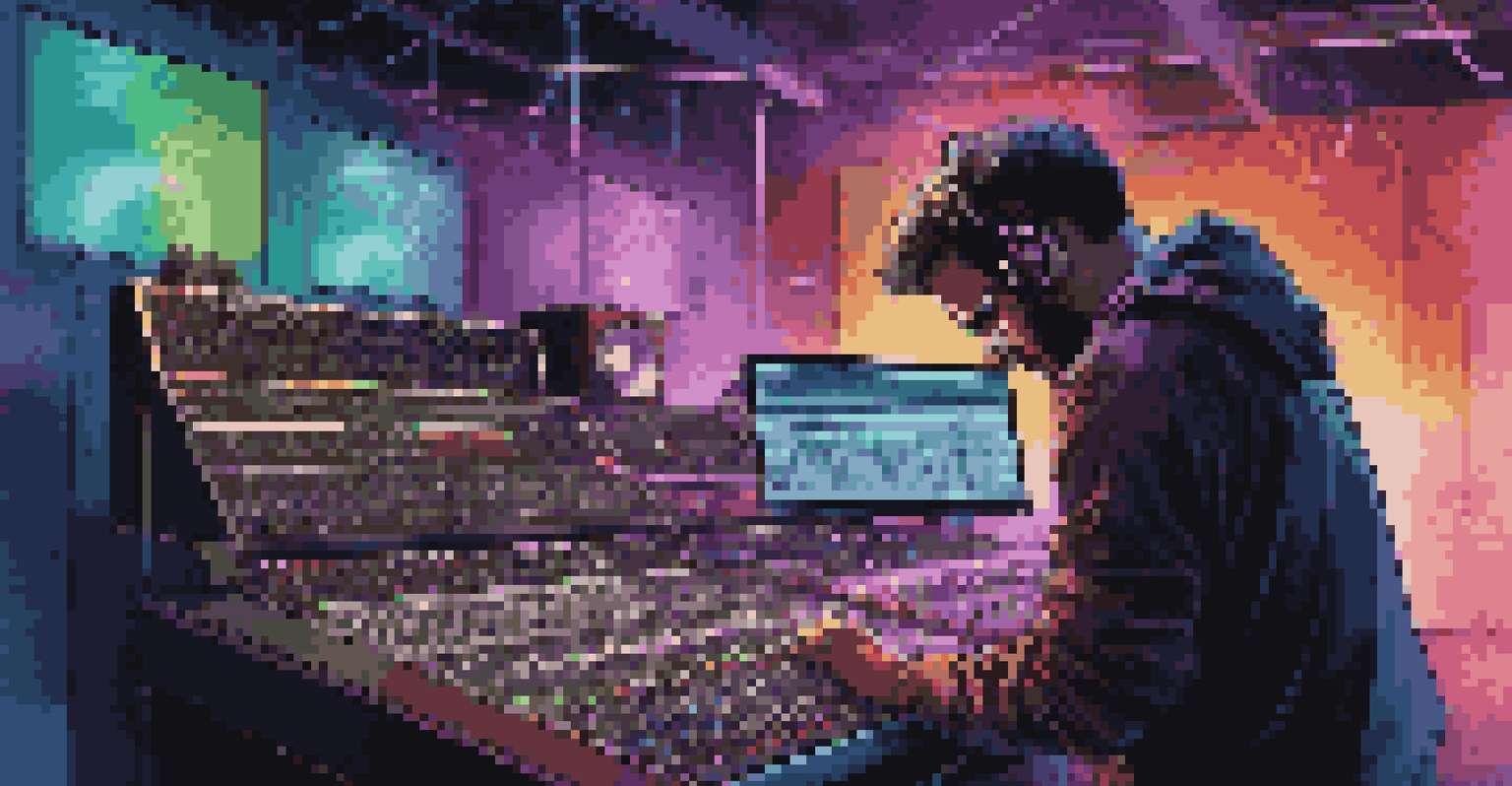Exploring Music Production Roles: From Producers to Engineers

Understanding the Role of a Music Producer
A music producer is often seen as the captain of the ship during the recording process. They oversee the entire project, from selecting songs to guiding artists in the studio. Think of them as a mix between a coach and a creative partner, shaping the sound and direction of the music.
Music is the shorthand of emotion.
Producers work closely with artists to bring their vision to life, ensuring that the final product resonates with their audience. They have a keen ear for detail, often suggesting changes in arrangements, instrumentation, or vocal delivery. This collaborative effort can transform a good song into a great one.
In the digital age, producers also harness technology to enhance recordings, using software and equipment to create polished tracks. Their ability to balance creativity with technical skills is what sets them apart in the music industry.
The Creative Genius: Songwriters in Production
While producers oversee the recording process, songwriters are the heart of the music, crafting lyrics and melodies that connect with listeners. They often collaborate with producers to ensure that their artistic vision is fully realized in the final product. Imagine the songwriter as a storyteller, weaving narratives that evoke emotions.

Songwriters can work alone or in teams, bringing diverse perspectives to the table. This collaboration can spark creativity, leading to innovative ideas that elevate a song. For instance, a catchy hook or poignant lyric can be the difference between a forgettable tune and a chart-topping hit.
Music Producers Lead the Process
Producers act as the driving force behind music projects, guiding artists and shaping the overall sound.
Their role is crucial, as the best songs often stem from a blend of personal experience and universal themes. By understanding their audience, songwriters can create relatable music that resonates with listeners across different cultures and backgrounds.
The Sound Architects: Audio Engineers Explained
Audio engineers are the technical wizards behind the scenes, responsible for capturing and manipulating sound during recordings. They're like the mechanics of the music world, ensuring that every note is recorded clearly and mixed perfectly. Their expertise in sound quality can make or break a track.
The music industry is a never-ending story of reinvention, collaboration, and creativity.
Engineers use a variety of tools and techniques, from microphones to mixing consoles, to achieve the desired sound. They must have a deep understanding of acoustics, signal flow, and digital audio workstations (DAWs). This technical knowledge allows them to troubleshoot issues and enhance recordings effectively.
Moreover, audio engineers play a critical role during the mixing and mastering phases, where they blend different elements to create a cohesive sound. Their attention to detail ensures that each instrument and vocal stands out, creating an immersive listening experience.
The Role of Mixing Engineers in Music Production
Mixing engineers focus on blending all recorded tracks into a polished final product. They adjust levels, panning, and effects to create a harmonious balance among vocals and instruments. Imagine a chef perfecting a recipe by fine-tuning each ingredient to achieve the perfect flavor.
Their work involves using various software and hardware tools to manipulate sound, making it crucial for the overall quality of the music. A well-mixed track can elevate a song, making it more enjoyable and impactful. It's where the magic happens, turning raw recordings into a finished piece of art.
Collaboration Fuels Creativity
The music production process thrives on teamwork, where diverse roles come together to enhance creativity and innovation.
Mixing engineers often collaborate closely with producers and artists to ensure that the sound aligns with the artist's vision. This teamwork is essential, as it helps to create a cohesive sound that resonates with listeners.
Mastering Engineers: Final Touches for Perfection
Once a track is mixed, it goes to the mastering engineer, who adds the final polish. Think of mastering as the last coat of paint on a beautiful piece of art, bringing everything together and enhancing its overall appeal. This step ensures that the track sounds great on various playback systems.
Mastering engineers focus on the overall sonic quality, adjusting compression, equalization, and limiting to create a balanced sound. They also make decisions regarding track sequencing and spacing, which can impact the flow of an entire album. Their expertise is crucial for making a song ready for distribution.
In today's digital music landscape, mastering is more important than ever, as listeners consume music across multiple platforms. A well-mastered track can stand out in playlists and radio stations, ensuring that it reaches a wider audience.
The Importance of Music Supervisors in Production
Music supervisors play a unique role in the music production landscape, bridging the gap between music and visual media. They select, license, and place music in films, TV shows, and advertisements, ensuring that the right song enhances the story being told. Imagine them as matchmakers, pairing the perfect song with the perfect scene.
Their work requires a deep understanding of both music and the specific needs of the visual project. They must consider factors like mood, themes, and character development when choosing tracks. This attention to detail can significantly impact how audiences perceive a scene or moment in a film.
Evolving Roles in Music Production
Advancements in technology are reshaping music production roles, leading to a blend of responsibilities and new opportunities.
In addition to selecting music, supervisors also negotiate licensing agreements, ensuring that artists are compensated fairly. Their role is crucial in promoting music and providing exposure to artists within the entertainment industry.
Collaborative Dynamics in Music Production Teams
The process of music production is often a team effort, involving various roles working together to achieve a common goal. Collaboration is key, as each individual brings their unique skills and perspectives to the table. Picture a sports team, where each player has a specific role, but success hinges on teamwork and communication.
Effective collaboration fosters creativity, allowing ideas to flow freely and evolve throughout the production process. Producers, engineers, and artists must communicate openly, sharing feedback and suggestions to refine the music. This dynamic can lead to unexpected breakthroughs and innovative sounds.

Ultimately, the strength of a production team lies in its ability to blend different talents and perspectives, creating a rich tapestry of sound. When everyone works in harmony, the result is often a standout track that captures the essence of the artist's vision.
The Evolving Landscape of Music Production Roles
As technology continues to advance, the roles within music production are evolving. With the rise of home studios and digital tools, more individuals are exploring their creativity in music production. This democratization has led to a diverse range of voices and styles entering the industry.
Despite these changes, the fundamental roles of producers, engineers, and other key players remain vital. They provide the expertise and experience needed to navigate the complexities of music production. However, the lines between roles are becoming increasingly blurred, with professionals often wearing multiple hats.
This evolution presents both challenges and opportunities for aspiring music producers. Those looking to break into the industry must adapt to new technologies while honing their craft. Embracing continuous learning and collaboration will be essential in this ever-changing landscape.